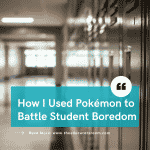by Jeannette Odom
Have you signed up for The Educator’s Room Daily Newsletter? Click here and support independent journalism!
Research on the effects of COVID-19 on adolescent brains is at the forefront of education today. A study from Stanford University suggests that the pandemic has physically altered adolescents’ brains, making their brains appear several years older than before the pandemic. This early onset maturation caused severe internalizing mental health problems and changes in hippocampal and amygdala volumes. These regions of the brain work together to regulate emotions, learning, and memory, which is why we are seeing such an increase in negative mental symptoms post-pandemic.
Why did COVID-19 affect students’ brains?
Previous research has shown that early adversity can accelerate brain maturation in children and adolescents. What we know from this research is that the brain adapts and changes over time according to life experiences—in this case, the hippocampus and amygdala regions. An alteration of the amygdala can increase and intensify aggression and fear. Subsequently, prolonged exposure to this mental stress alters the hippocampus, which aids in memory retention and regulating emotions. In short, adolescent brains that experience more stress than they are emotionally capable of managing develop out of sync with each region. Think of it as each region of the brain progressing on alternate timelines, with some on the right time frame and others years ahead. It creates a disequilibrium that children and teens do not know how to mentally cope with.
That’s why the studies of COVID-19 brain maturation are so similar to studies in chronic stress and trauma, according to a study published in Biological Psychiatry: Global Open Science. When we think of what the youth faced during the pandemic, it’s really just vast amounts of chronic stress. The COVID-19 pandemic led to increased social isolation, financial stress, exposure to familial violence, and all manner of adversity. In a study of adolescent teens, participants self-reported their depressive and anxiety symptoms using various instruments. In addition, MRI scans of the brain were used to calculate brain age gap estimates. Similar to the previous studies on early brain maturation from early adversity, findings indicated that the COVID-19 pandemic caused significant damage to the mental health and neuroanatomical development of adolescents, such as the amygdala and hippocampus.
What are the observable effects of COVID-19-related trauma?
We experience the effects of this brain maturation every day in the classroom. The table below is a summary of chronic stress symptoms that educators can be aware of based on their grade levels. However, keep in mind that many of these symptoms can overlap and are in no way limited to their age group, as everyone is unique and has experienced the pandemic differently.
- Emotional outbursts
- Increased irritability
- Trouble sleeping
- Nightmares
- Social withdrawal
- Frequent headaches/stomach aches
- Increased defiance
- Increased anger
- Low grades
- Trouble focusing
- Frequent headaches/stomach aches
- Sleep issues/fatigue
- Low attendance
- Low grades
- Social isolation
- Frequent illness
- Negative behaviors
- Difficulty concentrating
- Negative self-talk
- Anxiety
- Trouble sleeping/fatigue
- Neglecting responsibilities
- Eating changes/disorders
- Frequent illness
- Significant mood changes, including depression, anxiety, panic, or anger
- Social isolation
- Violent behaviors
- Utilizing alcohol, marijuana, or prescription drugs
What does this mean for educators?
Essentially, educators are now teaching classrooms full of students whose brains have been physically altered by chronic stress. This means being mindful of best practices for managing and preventing chronic stress. Here are a few ways to get started:
- Host meetings to check in with students’ mental health and daily lives
- Utilize games in your instruction
- Teach mindfulness and deep breathing techniques
- Teach visualization for de-stressing
- Help connect students and families to services they need
- Be a listener
- Make learning relevant to student’s lives, interests, and experiences
Here are some stress-reducing strategies that I have used in my own classroom:
- Plan for substantial time for independent work where students can ask for help.
- Let students sit where there they are comfortable and focused.
- Allow students to work in the hallway if they are feeling overwhelmed.
- Include differentiated ways that students can demonstrate understanding.
- Permit students to listen to their own music with headphones while they work.
- During an anxiety attack, instead of asking the students what’s wrong, ask them how they feel instead. From there, you can help them pinpoint when/why they started feeling that way.
- If I can tell a student is having a bad day, I’ll slip them a post-it note that simply says, “Are you ok? Let me know if you need anything.” Sometimes, it’s enough that they know we see them.
Implementing strategies such as these can create a more calm, relaxed environment for your students. Do you know who else it helped? Me. The pandemic forced chronic stress on everyone. Turning my classroom more into a welcoming haven created a space that felt safe and comforting to me as well. After all, teachers are usually in their classrooms more than their own homes. Take a moment to think of how your classroom could feel more relaxing to your students and to you. We all experienced the effects of the pandemic, and we are all healing together.

About the Author:

Jeanette Odom is 10-year veteran teacher with certifications in kindergarten–6 general subjects, kindergarten–12 visual arts, and kindergarten–12 English as a Second Language. She is currently a graduate student at the University of South Dakota, pursuing an interdisciplinary master’s degree in curriculum, leadership, cultural advocacy, and research. She loves combining her certifications to create rich, meaningful curricula with which culturally and linguistically diverse students can find relevance. She believes every student is reachable if we take the time to discover who they are and their passions. Relationships come first; teaching comes second.
Editor’s Note: If you enjoyed this article, please become a Patreon supporter by clicking here.





